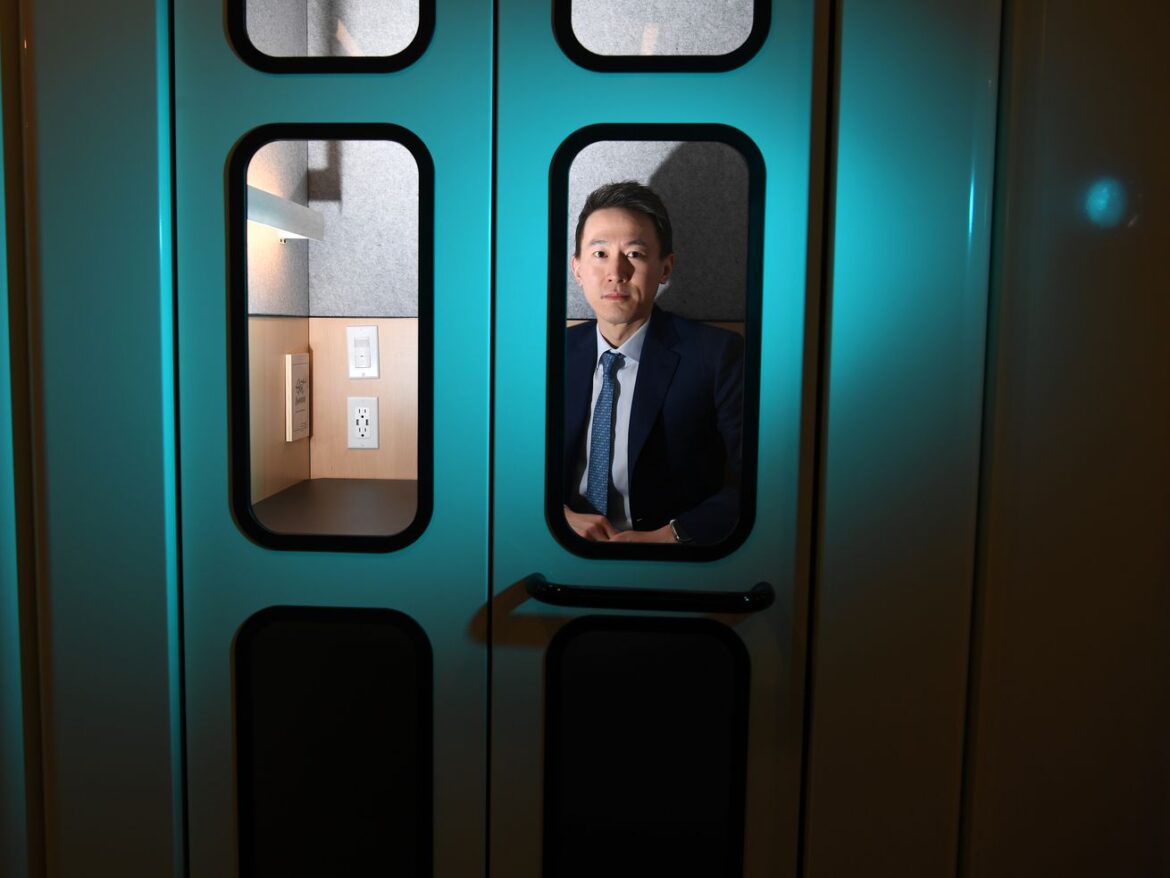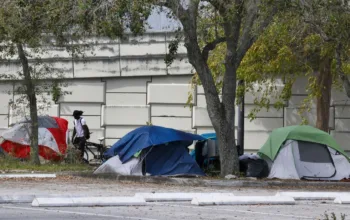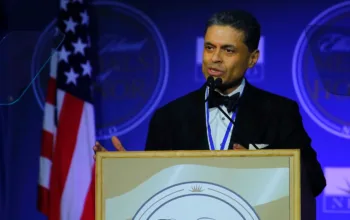TikTok CEO Shou Zi Chew will testify before Congress as the future of his app is in doubt. Or maybe it’s all just a lot of posturing.
It’s been a difficult few weeks for TikTok. An agreement with a government interagency group that it was depending on, which would allow the Chinese-owned app to continue to operate in the US, seems to have fallen apart. Without it, President Biden will likely soon have to make a final decision about the app: demand a sell-off, and be ready to ban TikTok if its owner ByteDance won’t oblige.
TikTok’s future in the US has perhaps never been in more doubt than it is right now. The status quo — an impasse where TikTok operates as normal with the seemingly empty threat of a ban hanging over its head — won’t be tenable for much longer. But the choices that the US and ByteDance are left with don’t seem very tenable, either.
This week might provide new clues about TikTok’s fate as its CEO, Shou Zi Chew, testifies before Congress for the first time. If he can find a few minutes in between being shouted at by various members of Congress, Chew will likely try to make the case to the American people that his app is safe, and that concerns over its links to the Chinese Communist Party are overblown. TikTok’s detractors believe the Chinese government may be using the app to collect data about its users, including Americans, and pushing content through its recommendation algorithm to influence the minds of the app’s younger-skewing user base.
Chew has been TikTok’s CEO for nearly two years, but you probably didn’t hear or see him much until recently. When a TikTok executive had to testify before Congress in September 2022, it sent chief operating officer V Pappas, a more well-known figure on the US tech scene — they worked at YouTube before joining TikTok in 2019, and briefly served as TikTok’s interim CEO before Chew took the reins. Pappas has also been happy to give the occasional interview to the press. Chew is based in Singapore and kept a low profile in the US until recently when he began to make TikTok’s case to the media and appealed directly to various members of Congress, after a deal with the government that would allow TikTok to operate here seemingly became less likely.
Now Chew will get what’s likely to be a public grilling from lawmakers, as high-profile hearings like this one tend to be more about representatives getting sound bites and camera time than they are about delving into whatever the hearing is purportedly about. The TikTok CEO will likely face hostility from Republicans and Democrats alike, but he may also get a chance to put forth TikTok’s argument for why it’s not a national security threat and why its continued operation in the US is a good thing — or at least why it’s no worse than other social media platforms. Perhaps, with the safeguards it’s spent more than $1.5 billion putting in place, Chew can even say TikTok is better. With a bipartisan bill called the RESTRICT Act, which would give Biden legal authority to ban TikTok if it passes, now in play, it’s crucial for the future of the platform that Chew and TikTok get this right.
“We welcome the opportunity to set the record straight about TikTok, ByteDance, and the commitments we are making to address concerns about US national security before the House Committee on Energy and Commerce,” Brooke Oberwetter, a spokesperson for TikTok, said in a statement.
But the hearing may actually be more important for the committee members that Chew is testifying before. This is also their chance to make their case to the American people that the threats TikTok poses are based in reality, rather than just possibility. At this point, TikTok’s users are very familiar with what TikTok does and its relative merits; it’s a hugely popular app that they tend to spend a lot of time on. But those users likely know a lot less about why the app they like is supposedly bad and should go away, taking a source of entertainment, creativity, and even news along with it.
The concerns over TikTok’s links to China are real: China wants data about Americans, and it’s happy to use social media platforms to seed disinformation campaigns. Meanwhile, a Chinese law says businesses must comply with government orders. Even if ByteDance didn’t want to give China TikTok user data or push disinformation or propaganda through its recommendation algorithm, it wouldn’t have a choice. But there’s no evidence, at least not publicly, that this has ever happened. And ByteDance has denied it ever has or would — not that that means much to the people who are determined to believe it did.
With these national security concerns in mind, the Committee on Foreign Investments in the United States (CFIUS) began to investigate TikTok in 2020. Eventually, the two parties came up with a draft agreement that could have satisfied everyone: There would be enough protections and third-party oversight to convince the government that China couldn’t interfere with the app, while also allowing the app to stay in the US for the tens of millions of people who use it and the businesses that increasingly rely on it. It was called Project Texas, and TikTok made it seem like the best of both worlds, but the Justice Department is believed to have refused to sign on to the deal and may well have killed it. (CFIUS, through the Treasury Department, declined to comment.)
That left the Biden administration to do what it reportedly did last week: demand that ByteDance sell off TikTok or face a US ban. And for the Americans, all the better if TikTok were to find a US owner, since that would help maintain US tech supremacy without any of the annoying potential national security issues a China-owned TikTok brought with it.
ByteDance divesting of TikTok is not a perfect solution, but it seems to be the best outcome as far as the US is concerned. The problem is that a tidy little end result may not be possible.
Even if ByteDance did want to sell off TikTok — and the prospect of a US ban would render TikTok far less valuable — it may not be able to. The Chinese government, which put TikTok’s algorithm on a list of restricted exports back in 2020, would have to approve TikTok’s sale. It may not want to give the US a win here, even if it means causing one of its own companies significant harm (China’s citizens won’t care if TikTok gets banned, since it’s not available there. Instead, they have a very similar app called Douyin). There is also, of course, the possibility that China needs TikTok to do all of the spying and propaganda pushing its detractors say it’s capable of doing, which would make it want to hold on to that as long as possible all the more. And then there’s the possibility of retaliation.
“Any action on TikTok is likely to produce some response from China,” said Lindsay Gorman, the senior fellow for emerging technologies at the Alliance for Securing Democracy. “When the Trump administration attempted to ban TikTok in the US back in 2020, China put out a new ‘Unreliable Entity List’ targeting US firms, so we could see additions there, as well as an aggressive diplomatic and propaganda push to paint national security concerns as unfounded.”
So without a sale or mitigation plan, Biden has to either ban the app or do nothing. Doing nothing seems highly unlikely at this point, with several states and the federal government banning TikTok on government-owned devices and the introduction of the RESTRICT Act, which would lay the legal groundwork for a ban not just of TikTok. The Biden administration issued an endorsement of that bill moments after it was announced, indicating that it’s on board with the idea of a ban or at least a viable way to issue one.
If Biden does nothing about TikTok, it would make him look weak in the face of a foreign adversary and national security threat. But if he bans it, there could be even more downside. Banning TikTok hurts free speech; angers potentially 150 million users, many of whom can or will soon be able to vote; sets a potentially dangerous precedent; and, again, risks retaliation that could hurt American businesses.
For Biden, it would be ideal to have a real reason to do the ban, like hard evidence of a national security threat. Instead, there’s just the potential of it we’ve seen bandied about up until now, sprinkled with a few anecdotes that suggest it might be something more. For example, ByteDance admitted last year that it accessed US journalists’ location data while investigating an internal leak. That’s not quite China spying on all of us, but it’s not a good look, either. And it’s one that the Justice Department reportedly seized on — all the better to make the case against TikTok’s continued Chinese ownership.
If it actually does come down to a ban, James Andrew Lewis, director of the strategic technologies program at the Center for Strategic and International Studies, who has long been skeptical of the national security threat posed by TikTok, thinks the Biden administration and TikTok will still find a way to avoid it.
“My bet is, you see some kind of ban announced … followed by some kind of mitigation deal when TikTok decides to accept it,” Lewis said. “This is all politics now.”
This lack of evidence of TikTok doing actual, demonstrable harm to the American people is the real sticking point when it comes to taking TikTok away from them. It always has been. What China could possibly do with more access to their user data might not be enough to convince Americans who like TikTok that the app should be banned. (This threat also ignores the reality that plenty of smartphone apps and websites secretly collect data about users all the time, as well as reports that some of the same state governments that banned TikTok on government devices also host its tracking pixels on their own sites.) Maybe this week’s hearing will help clarify just how big of a threat TikTok is. But if it doesn’t, Biden will have to choose the lesser of two evils without there being a consensus on what the lesser even is.
There is a third way. For all of the concerns over China spying on and pumping disinformation at Americans through TikTok, the fact is that China doesn’t need TikTok to do that. China can and does buy data about Americans from data brokers and hacks into various businesses and government systems, some of which are far richer sources of data than TikTok is. China is also known to run disinformation campaigns on American social media platforms, as do a lot of other countries (including the US). If the US government were as concerned about spying online as it claims to be, it would pass laws to prevent it that apply to everyone.



